Growing a festival that supports nonprofits, promotes horticulture, and creates community.
In the Cape Cod Hydrangea Festival’s fifth year I knew the event was a success when one young woman visited my garden. She walked down my long driveway, past several hydrangeas and other flowering shrubs, coming to a stop by the large flower garden at the front of my house. Her hands flew up to her chest, and I heard her intake of breath before she said, “Oh! I didn’t know this was possible.”
As someone who speaks, writes, and broadcasts about plants and gardens, my goal is to get people excited about horticulture. We garden communicators want to help others be successful and to better understand plants and the natural world. And yes, we want familiarize people with what is achievable. But although that young woman’s reaction alone made the festival a triumph in my eyes, this annual event continues to create greater good on Cape Cod and to areas beyond. It’s also a model for what can be done in other parts of the country.
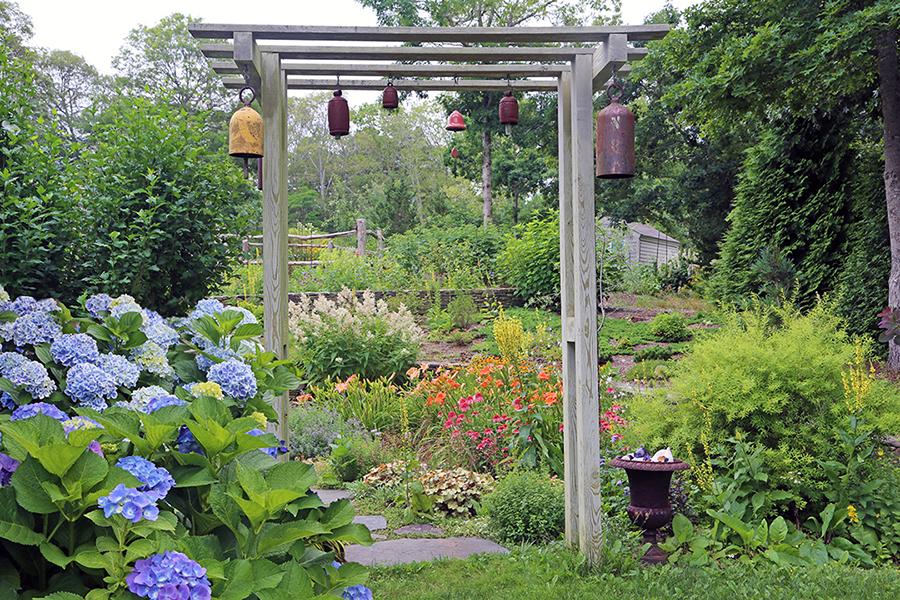
My gardens are open with bells on during the festival in July. Not only are the hydrangeas in full bloom, but the daylilies and many other perennials are pretty spectacular as well.
I was inspired to start the Cape Cod Hydrangea Festival when I heard Sally Cunningham, a fellow garden writer speak about Garden Walk Buffalo. This weekend event in Buffalo, New York is America’s largest garden tour, with more than 300 gardens over a single weekend in July. I remember her saying that at that time, in 2014, this event brought in over 3 million dollars to the city of Buffalo in that one weekend. “Hmmmm…” I thought as Sally finished speaking. “If Buffalo, NY can do this, what might we be able to do on Cape Cod, especially if we organize it under the umbrella of our signature shrub, the blue hydrangea?”
Later that fall, when local horticulturalist Marcia Chapman and I drove home after an UMass Extension educational event about impatiens downy mildew, we brainstormed about holding an annual Hydrangea Festival. We spoke about how it could be good for local garden centers and nurseries, and the ways it would encourage the public to do more gardening. Imagining how restaurants and inns might become involved, I proposed that bartenders might create their own Hydrangea Cocktail, offering the beverage in pink or blue. We talked about museums having garden related exhibits, or local craft fairs selling garden ornaments.
While it was easy to imagine how businesses and horticulture would profit from such a festival, I began to wonder if our local nonprofits might also benefit. So a few months later, when Marcia asked, “Have you got that Hydrangea festival going yet?” I laughed and replied, “Not quite…” I didn’t mention, however that after our initial brainstorming together, I’d come home and bought the URLs for hydrangeafestival.com and capecodhydrangeafest.com.
Anyone that’s done fundraising for a nonprofit organization knows that when fundraising you’re usually drawing from your base. If you have a dinner, it’s the same supporters that come. When there’s an auction, event or campaign to raise money, you tend to have the same people and businesses contribute. On Cape Cod this is especially problematic since we live on a long, thin stretch of land, and many nonprofits depend on the same supporters. As someone who has served on the board of a local education foundation, I knew that I wanted a hydrangea festival to be able to raise some “out of town money” for our nonprofits. Once I thought of how this could be done, I wrote up the proposal and took it to the Cape Cod Chamber of Commerce.
My proposition was that all gardens would be open for the benefit of a nonprofit. That organization would help with the staffing and would collect a $5.00 per person entry fee, which would go directly to the nonprofit. They would also be free to have other fundraising at their gardens, be it sales of garden related merchandise and plants or the collection of donations. The nonprofit would “join the festival” by paying a $50 fee to the Chamber if they weren’t already CCCC members. Additional funding to underwrite the running of the festival would come from sponsors, both local and national.
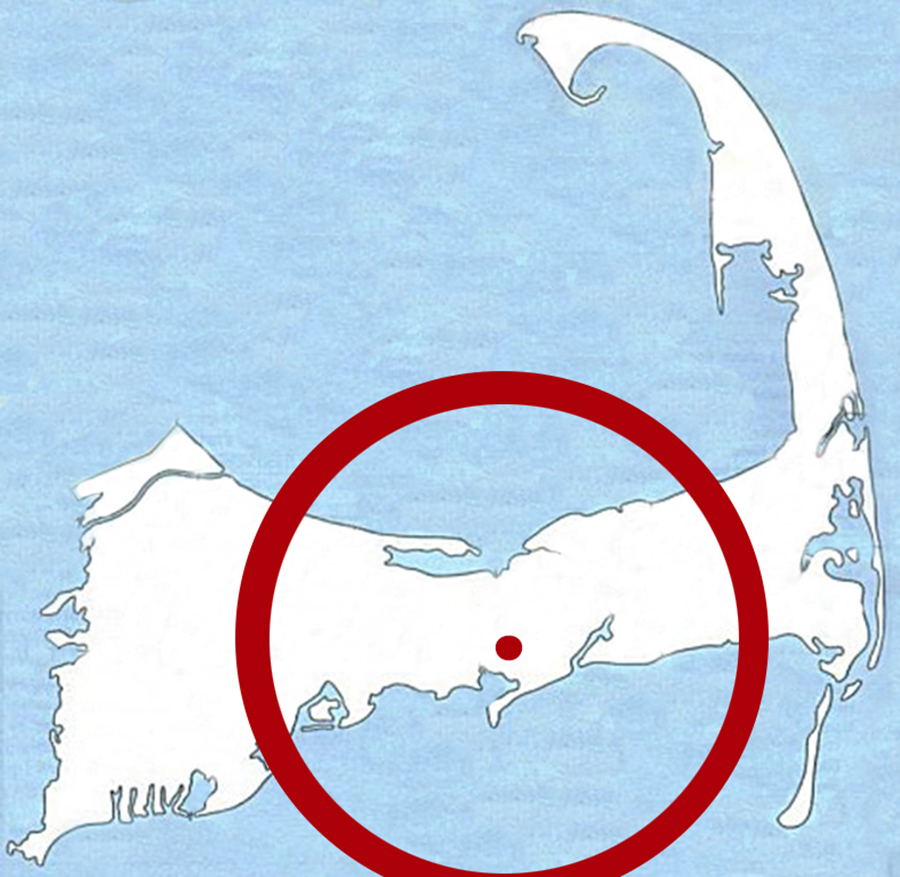
If you put a dot for a nonprofit on the map of Cape Cod, and draw a twenty mile circle around it, you’ll see that about 50% of your possible supporters are fish. And fish are not known for their philanthropy.
I’m very happy that Wendy Northcross, at that time the Chief Executive Officer of the Chamber, saw the potential in this event and was willing to take it on. Although there was a group of enthusiastic volunteers who were immediately onboard to help, I knew that such an effort would need paid employees behind it. Volunteers get tired, and can occasionally have differing opinions that cause things to fall apart. It was with great pleasure that I gave the URLS for the fest to CCCC, and we proceeded to plan the first event for the summer of 2015.
The first festival earned over $25,000 for the nonprofits involved. The overachiever award (in my mind only…there were no awards given out) went to the Eastham Public Library Building Fund. They had several gardens on tour and raised over $10,000.
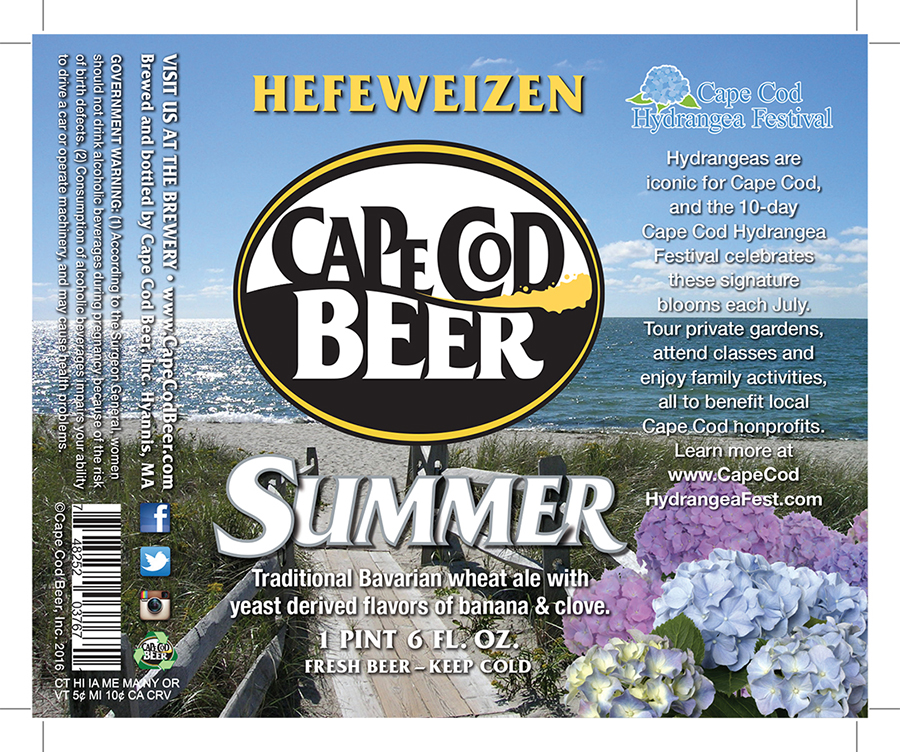
Many people immediately saw the potential for the Hydrangea Festival. Beth Marcus, co-owner of Cape Cod Beer at that time, put Hydrangeas and information about the fest on their Summer Ale label.
Since 2015 the Cape Cod Hydrangea Festival has continued to grow. In 2025 we had over 100 gardens on tour, with 40 nonprofits benefiting. I’m particularly pleased that in 2025 we had gardens open for four local food banks, in addition to libraries, Hospital Auxiliary funds, arts organizations, churches, and garden clubs to name just a few of the nonprofits that benefited. We’ve received some national media attention that has resulted in people traveling to Cape Cod for the festival from many parts of the world. I’ve spoken to several visitors to my gardens who said that coming to the Cape for the festival has been on their “bucket list.”
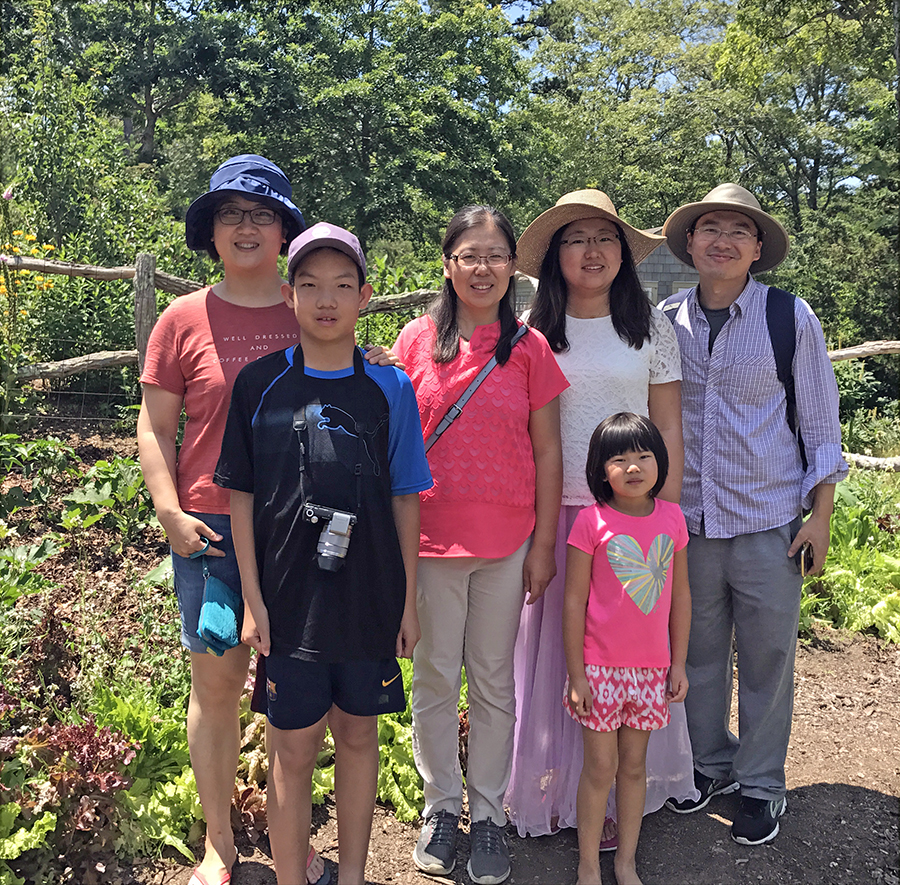
This family came to the Cape for the Hydrangea Festival from Beijing China. I’ve had visitors from Australia, France, Germany, Ukraine, Canada, and the UK in my gardens…not to mention those from throughout the USA and Cape Cod.
This year I was reminded that it isn’t just Cape businesses and nonprofits that benefit from the festival, but the individual gardeners and volunteers as well. One of the women who collected money in my garden told me that she hadn’t anticipated how much fun it would be to talk to those who came. She enjoyed asking them where they were from, and hearing how delighted they were to be able to see gardens that aren’t normally open to the public.
A man who had opened his garden for the first time came up to me at Hyannis Country Garden, where I work, to tell me how much fun he and his wife had. “It was worth all of the hard work we did getting the gardens in great shape,” he said. He’d discovered that having his garden on tour allowed him to see his property with fresh eyes. While he and his wife would notice what needed to be done, or the plants that weren’t thriving, visitors saw none of that. “It was great hearing them say things like, ‘I love what you did here…I never would have thought of that!’” he told me.
In 2017 I was fortunate to visit Buffalo, NY, and see many of the gardens that were open for Buffalo Garden Walk. It was clear that for this lovely city their tour weekend had made gardening contagious. It was also nice to see how the abundant and bold use of color created a Buffalo Garden Style that continues to draw people to their festival every year.
Looking to Buffalo Garden Walk and the Cape Cod Hydrangea Festival, here is what I would advise those who are interested in creating something similar in their region. 1. Find what is special about your area and build the festival under that umbrella. For Buffalo it is the bold use of color. For Cape Cod it is the outrageous blue hydrangeas we grow so well. Use what is unique in your region, be it a style, particular plant, or a group of public gardens that can ban together to create a garden hop event. 2. Decide if you want nonprofits to benefit, and how to structure that into the event from the beginning. 3. Find an organization with paid employees who is willing to own your festival and build it moving forward.
The Cape Cod Hydrangea Festival isn’t just about hydrangeas. Our tagline is “A Celebration of Summer Gardens” since not all gardens on tour contain many hydrangeas. Yet beyond gardens, it’s a celebration of how a community can come together to create something good. That’s always worth cultivating.
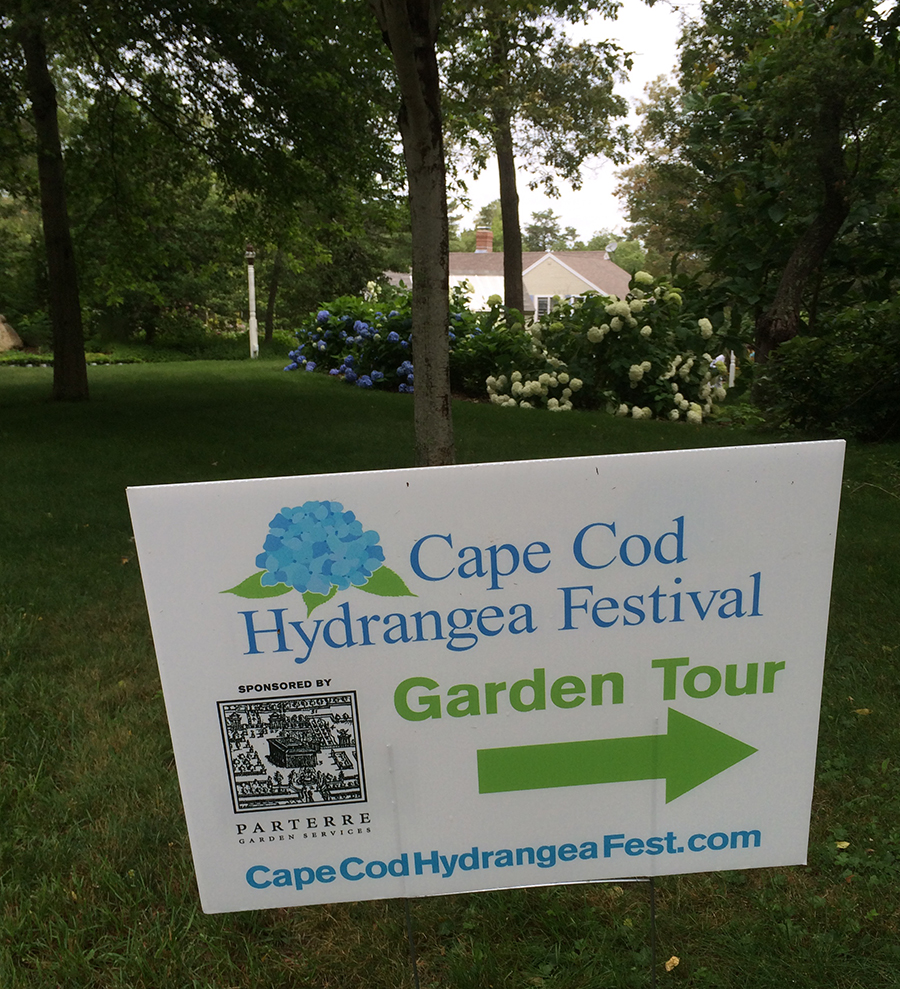
The first year we had one Principal Sponsor of the festival, Parterre Garden Services
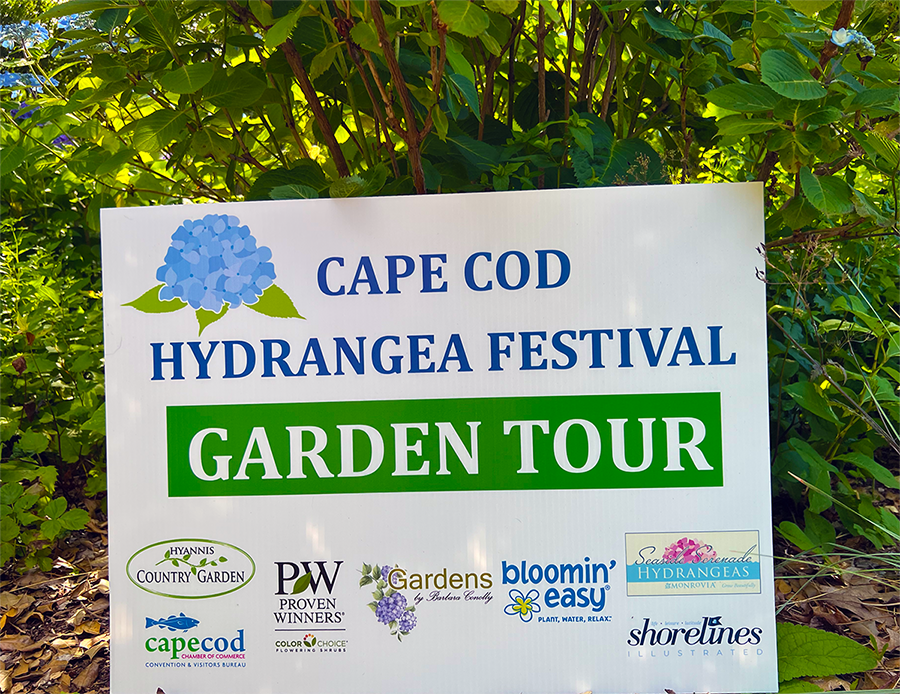
Now there are many Principal Sponsors – this was a sign from 2022. Thanks to all who support this festival.
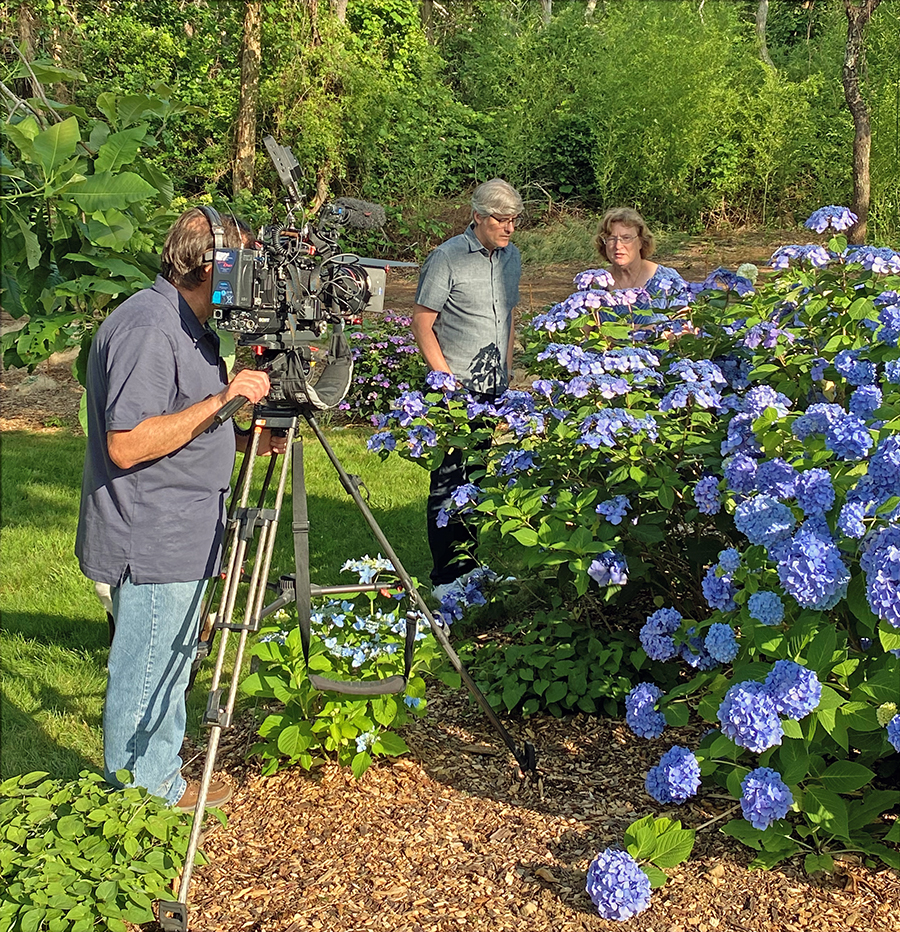
In 2021, as we were relieved to be coming together after the pandemic of 2020, the CBS Sunday Morning crew was on the Cape to do a segment about the festival.
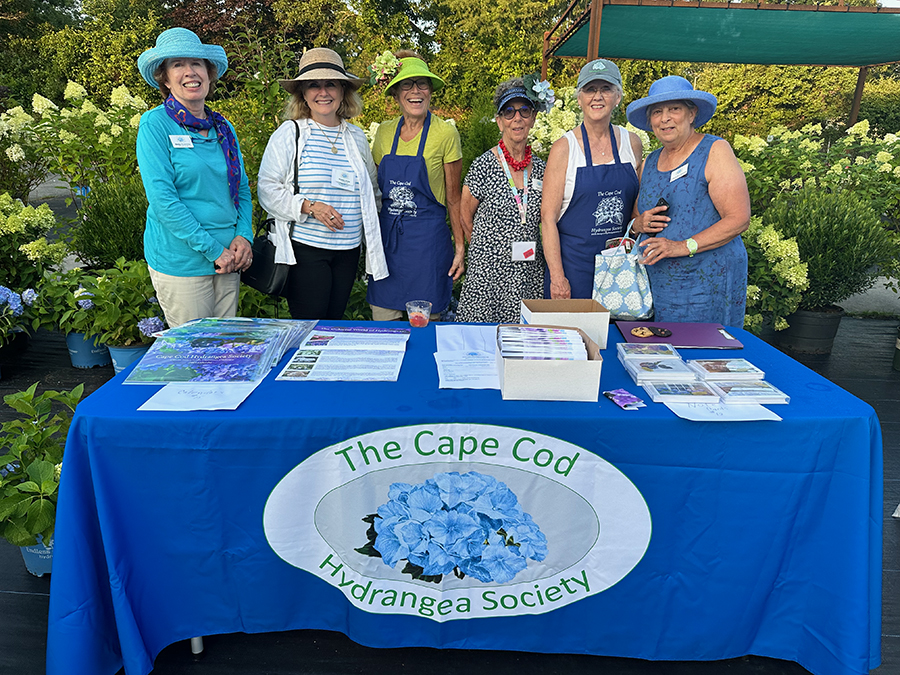
The Cape Cod Hydrangea Society was an immediate supporter of the festival and many of its members have their gardens open during the ten days. This was the table staffed by some of the members at the kickoff party at Hyannis Country Garden in 2024.
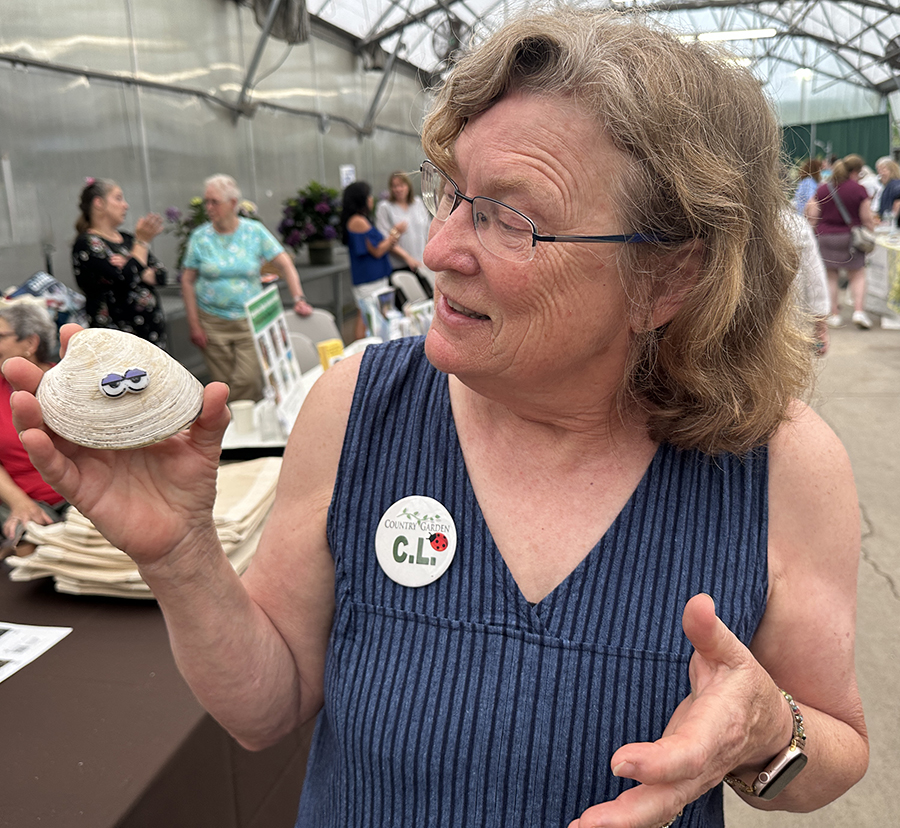
C.L. Fornari talks with Cape Cod shellebrity Doug the Quahog, at the kickoff party in 2025.
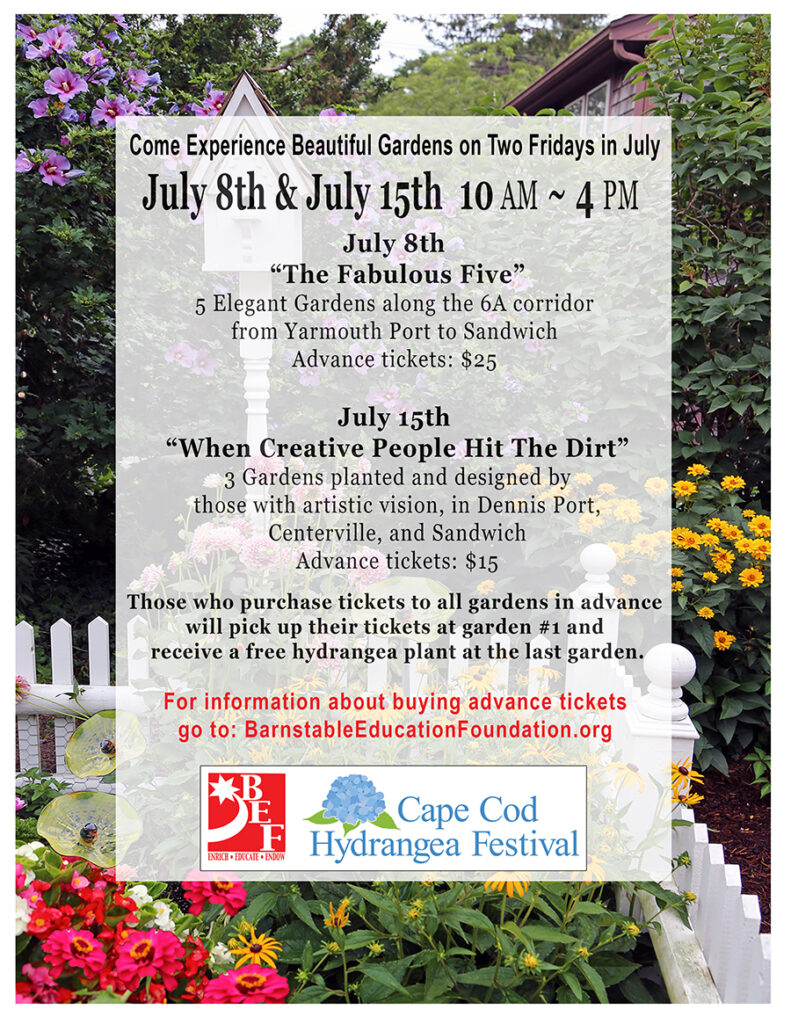
I was on the board of the Barnstable Education Foundation in 2014 when I first proposed the Hydrangea Festival to the Cape Cod Chamber of Commerce. I wanted a way for local nonprofits like this one to get “out of town money.” The BEF had several gardens open for the first five years of the festival.
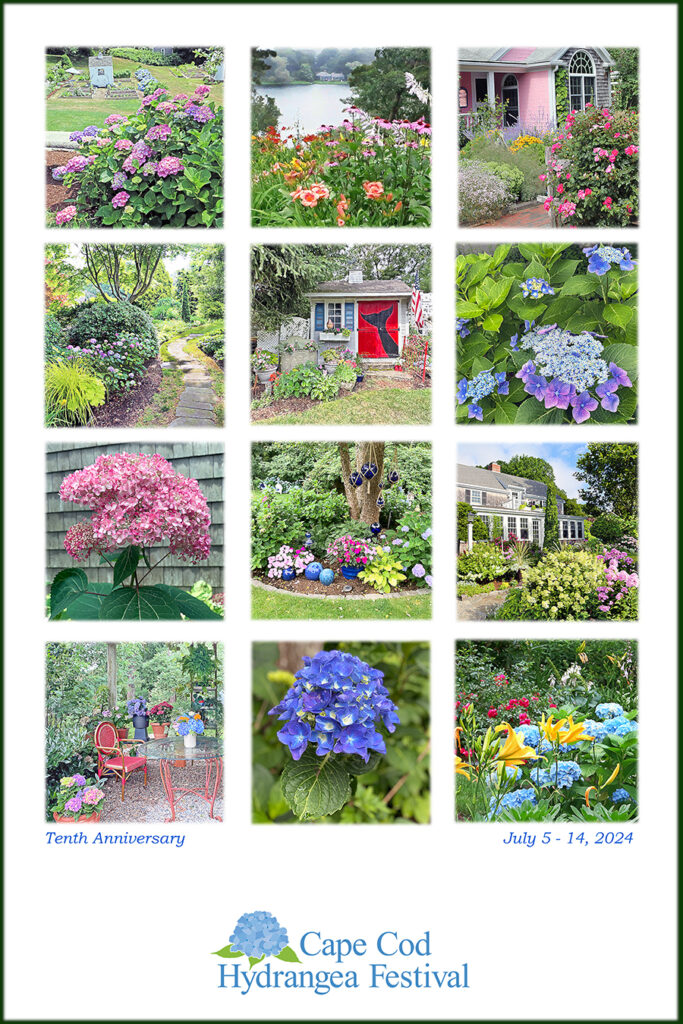
This was the poster that celebrated the Hydrangea Festival’s 10th Anniversary. It showed a small fraction of some of the gardens that had been open in the past ten years.
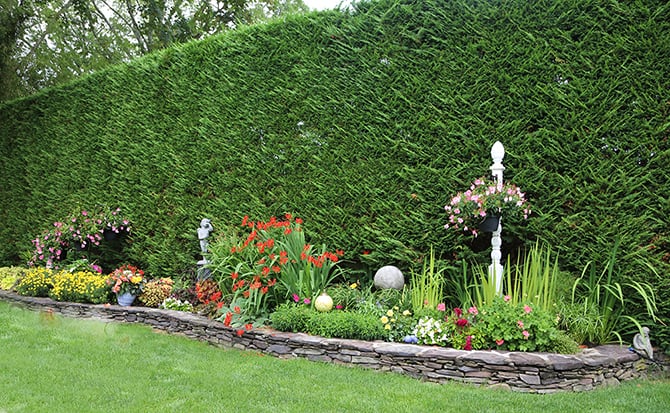
It’s not just about Hydrangeas, of course. This is my friend Helen’s garden and her “Great Wall of Leyland” which showed people what they could do with Leyand Cypress to keep them thick and full for privacy. Helen’s garden is also an example of how someone can be creative and have fun with garden ornaments.

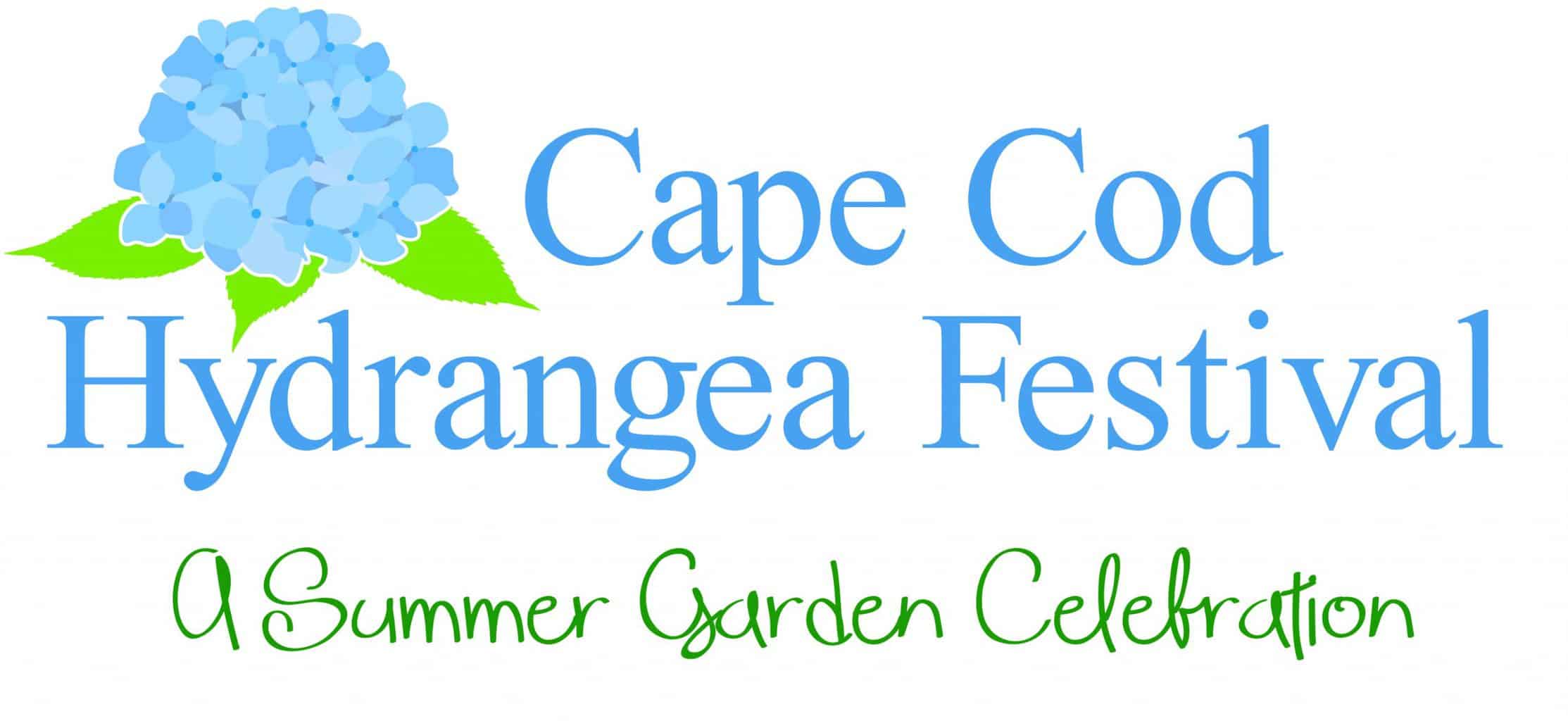

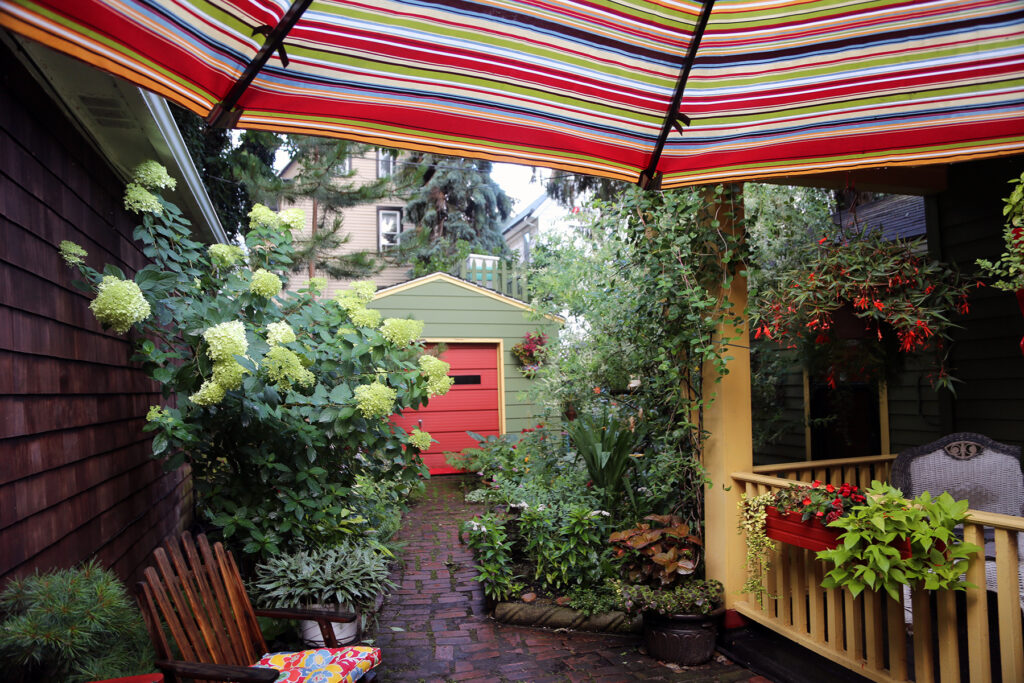


0 Comments